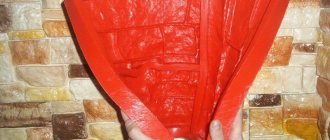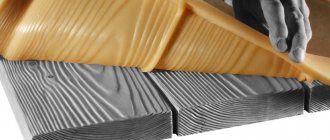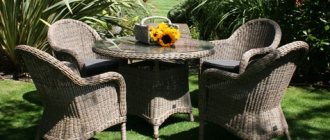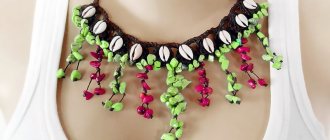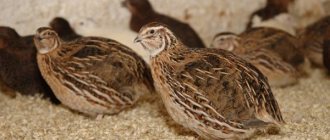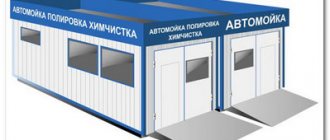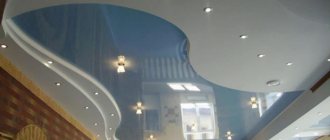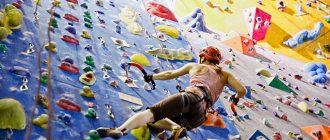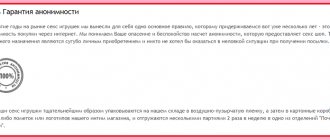Business relevance
Artificial stone is widely used in the furniture industry. It is used not only for the production of countertops, but also window sills, sinks, bar counters, stairs, etc. This demand is due to excellent technical characteristics - the material is very durable, resistant to mechanical stress, durable and most importantly - it looks very beautiful.
Companies producing artificial stone countertops quickly recoup their investment costs and reach the break-even point after just a few months. We can talk about the prospects of a business due to the following factors:
- low cost of such material compared to the selling price;
- lack of strict requirements for the preparation of the premises;
- accessibility – all consumables are easy to find and order for any region;
- little competition;
- high demand.
Video - Artificial marble sinks (How it's made):
Do-it-yourself tabletop made of cast acrylic
Many people think that a solid tabletop without seams is the best possible option. Easier to maintain, no leaks. This is true, but the material itself (acrylic) is not easy to use everywhere. Acrylic itself is an excellent material. For a bathroom, an artificial stone countertop is a good choice. There are very few opportunities to scratch the surface and there are no high temperatures. And moisture, steam, soap and other detergents are not afraid of plastic. If you decide to master the technology of casting an acrylic countertop, you can try making it for the bathroom.
A non-specialist cannot distinguish one type of artificial stone from another by appearance
Preparation
To pour acrylic, make a mold. For its manufacture, laminated chipboard or MDF is used. If the surface of the countertop must be smooth, the formwork material must also be smooth. If texture is needed, it should be on the form. After removal from the mold, the acrylic stone will repeat all the grooves and tubercles. Therefore, we are meticulous in selecting material for the mold.
We frame the cut-out workpiece with sides, close the holes for the hob and sink with technological plugs
The sides are made from the same material. The edges of the planks are sanded first with a coarser cloth, then with an increasingly finer sanding disc. Increasingly decreasing grain sizes are used. Remember that all defects will then be cast in acrylic. And they are very noticeable if the stone chosen is plain, without inclusions. The seams are sealed and leveled. The structure is thoroughly cleaned, dried, and then covered with wax from the inside.
Making a countertop
Fillers are added to acrylic - stone or marble chips, pigment, decorative components. Everything gets mixed up. Lastly, the hardener is poured. Acrylic is poured in several layers, so the hardener is added only to part of the composition.
The composition is distributed over the plane
An acrylic composition is poured into the finished formwork. Distribute it evenly over all areas. It should spread over all elements of the form. In this case, bubbles must not be allowed to appear - the air must be removed. After the composition has been distributed, a sheet of chipboard is placed on top, which is also lubricated with wax. A load is placed on the chipboard. It must be selected carefully so that the composition does not squeeze out on the sides. The load is left for half an hour. Then they remove it and lift up the chipboard. A second portion of plastic is poured into the mold and left for a day. During this time, the acrylic will harden. You can remove the formwork.
Installation on frame and polishing
After the plastic slab has been removed from the formwork, it is attached to the frame. Acrylic is an elastic material. Even with a thickness of 20-30 mm, it bends. To ensure stability of shape, the frame is assembled. It is made of wood (timber 50 mm thick or more) or moisture-resistant plywood (thickness 27 mm). The frame consists of slats along the front and rear posts, transverse jumpers installed in increments of 40-50 cm. The slats are also placed in places where they rest on the furniture frame. More reinforcements are needed in areas of greatest load. This is where the hob or sink will be installed.
A solid worktop for a kitchen or bathroom is also fixed to the frame
The frame is made with an acrylic thickness of more than 10 mm. A thinner layer requires a solid base. That is, you need to cut out a repeat of your tabletop from the same plywood and glue these two sheets together. The thickness of the plywood is 27 mm or so. You can glue two thinner sheets. It turns out cheaper. For normal gluing, the sheets are fixed with clamps.
The final finishing is sanding. First, with discs with fine grains - from 320 and above, and finally - with a polishing attachment. This stage is important for appearance. Most of the flaws can be removed. But it can also cause harm.
Stages of building a business
The main thing in this area of production is to establish permanent sales channels. The further development and profitability of the project will depend on this. Main stages of building a business:
- market monitoring;
- conducting negotiations with potential customers, searching for sales channels;
- concluding agreements with suppliers of consumables;
- business registration, registration of permits;
- rental and preparation of premises;
- recruitment;
- equipment purchase;
- marketing;
- production control.
Equipment for the production of countertops
The manufacture of countertops is a high-tech industry. To organize it, you will need more expensive equipment, which is ready-made lines. If you have an idea to master this process yourself, then in addition to the specified equipment for vibration casting you need to purchase:
- milling cutter;
- grinding machine;
- jigsaw
When making countertops yourself, special attention is paid to the reinforcement of the poured material, high-quality milling and grinding. To obtain a smooth surface, bulk materials are added to the solution, passed through the finest mesh of a vibrating sieve.
Manufacturing technology
Making countertops or window sills with your own hands seems simple only at first glance. This is a rather labor-intensive process.
In order for parts to be manufactured with 100% accuracy, it is necessary to carefully adhere to the specified parameters.
For work, it is recommended to hire conscientious personnel who have experience working with production equipment. Video - Technology for manufacturing products from liquid granite: The technology for manufacturing countertops with a sink made of artificial stone consists of the following stages:
- drawing up an accurate drawing according to the specified parameters and customer requirements;
- sawing the sheet in accordance with the specified dimensions;
- edge processing for uniform cutting;
- seam adjustment;
- connecting the sides to the base;
- rounding of edges (if required by the order) and further polishing;
- pattern of holes for sinks and other appliances;
- polishing the finished product.
It is better to buy material from direct suppliers. Most of them provide a catalog with a fairly wide range of different sheets for making artificial countertops. Video - Instructions for working with acrylic stone:
Production of artificial stone products
Let's figure out how to organize the production of countertops made of artificial stone and plan a business in this production. There are two main widely used technological methods for producing acrylic countertops. First of all, this is the described method of pouring countertops into an individually prepared mold with your own hands, perhaps even somewhere in a small room near the house or in the garage.
The initial stage of such production is the preparation of templates and blanks. To make artificial stone countertops for the bathroom, they are one, and for artificial stone countertops for the kitchen, they are different. Bases made of any material are used as blanks, which will be used for subsequent spraying of acrylic resin with filler. The most suitable material for the template is chipboard. The template is made so that it recedes approximately 5mm from the edges of the future tabletop. This gap will allow you to make the edges of the tabletop strong, give them the desired shape and sand them to the required cleanliness.
To cast a tabletop 4 centimeters thick, you need to make one blank and one template. If the required thickness of the tabletop is greater than the specified size, then you will need 2 templates and 2 blanks. When pouring, the template and the workpiece are connected using a stapler or screws. To obtain the required allowance, a hand router is used to trim the workpiece to the required edge thickness.
An acrylic resin-based composition is applied to the workpiece located in the mold. There are two ways to apply the composition in a liquid state to the workpiece: by direct and by reverse spraying.
Direct spraying of acrylic resin onto the workpiece
This technological operation consists of several stages:
- the workpiece is covered with primer with a hardener selected to match the color of the future tabletop, trying to apply it in an even layer;
- by sanding the workpiece after the soil hardens, a perfectly smooth outer layer is achieved;
- the primed surface is covered with artificial stone in a liquid state with a spray gun, first from the edges, then along straight sections;
- the applied layer is given time to harden;
- the next, last layer of the composition is applied;
- after 6 hours, when the product has completely hardened, the final finishing of the surface, including the edges, is carried out using abrasive sandpaper and Scotch Brite.
Reverse spray method
This technological technique makes it possible to organize mini-production of countertops as a business.
Reverse spraying steps:
- a mold is made where LMDF or fiberboard strip material is used as the formwork material;
- the template with the workpiece is placed in formwork, adjusted along the contour and height, which should be equal to the thickness of the product (from 40 to 60 mm);
- the mold is lubricated from the inside with a composition that is not wetted by resin;
- spraying with liquid stone is carried out, three times on the end sections and twice on the flat ones;
- at the moment of intensive crystallization of the composition, a reduced form of several millimeters is placed on top of it and pressed with a weight so that the resin protrudes slightly above the edges of the edge sections;
- the composition is allowed to harden completely within 24 hours;
- The formwork is disassembled and, using mechanical processing followed by polishing, removal of drips and various deviations from the correct shape of the tabletop is carried out.
Materials and equipment for the production of acrylic countertops
If you trace the technological stages of manufacturing products, you can understand what equipment and materials are required for each of them. Countertops made of artificial stone do not require expensive and complex types of equipment for their production, on which large sums of money will have to be spent.
The most expensive tools are an electric jigsaw, a sander and a router. You can buy equipment for the production of artificial stone countertops without any problems, since all this is sold in any electrical goods store. To reduce the cost of organizing a business even less, you need to try to eliminate hard manual labor as much as possible. For example, instead of manually making templates and blanks for countertops, it is recommended to buy ready-made matrices and further spray them with an acrylic composition. These matrices usually last up to 10 years and pay for themselves a hundredfold in business, especially if large-scale production of countertops is organized.
The technology for manufacturing artificial stone products is so diverse that when producing commercial products, you can choose almost any color scheme at the request of the client, apply various images in the form of logos and simple drawings to the countertops.
This is interesting:
Foam concrete production as a business.
What tools are needed to make furniture?
How to draw up a business plan for the production of corrugated sheets?
Installation of countertops in furniture sets
To install an artificial stone countertop into a set, you need to understand that this is a rather important and responsible matter. If everything works out, then everything can be installed in literally an hour, but often the master can spend the whole day working on this. It all depends on the complexity of the product and how many parts it consists of.
If it is a simple window sill or a small table, then installing countertops made of artificial stone is not difficult. It is much more difficult to install the product in the kitchen, because kitchen countertops, consisting of several parts, are complex in shape and have a lot of weight. They are not easy to deliver to the customer, nor is it easy to install the product on a solid foundation. Usually, the product is secured by gluing, and all sizes and shapes of the products are adjusted at the furniture factory. On-site installation is carried out using ready-made basic elements.
Financial calculations
To organize a business you will not need a large start-up capital:
- purchase of equipment and inventory – 40 thousand rubles;
- preparation of the premises - 20 thousand rubles;
- purchase of consumables (for stock) – 200 thousand rubles;
- registration of permits – 800 rubles;
- marketing expenses (this item is considered to be the starting one, since it is assumed that a long-term contract will be concluded with a permanent customer company) – 10 thousand rubles.
It is more profitable to buy consumables for production (for example, from acrylic stone) in Asian markets. But since interruptions and delays in delivery may occur, it is recommended to create a reserve for normal effective work with clients (in our example, 200 thousand rubles).
Approximate fixed costs (per month):
- purchase of consumables – 200 thousand rubles;
- rental of industrial premises (50 m² area) – 20 thousand rubles;
- wage fund – 100 thousand rubles. (2 hired workers).
According to average calculations, the cost of the finished product is twice as expensive as the consumables.
With 100% sales of goods, revenue will be 400 rubles (200 thousand rubles x 2).
Net profit: 400 – 200 – 20 – 100 = 80 thousand rubles.
As you can see from the calculation, you can recoup your initial investment in a few months: 270800/80000=3.4.
Video - Production technology for countertops with a sink made of liquid stone:
Production room
For production, first of all, it is necessary to prepare a room in which the equipment will be placed and finished products will be stored. Ideally, it should consist of 3 separate parts:
- main production premises;
- warehouse for storing finished products;
- warehouse for consumables.
Workshop for the production of artificial stone - diagram
The work shop in which the production equipment is located must have an area of at least 50 m2 and be heated.
Space is necessary for comfortable movement of workers and convenient placement of equipment. To prevent the solution from freezing in winter, the air temperature in the workshop should not be below 00C. The optimal range is 15–250C.
The production premises are supplied with water supply and electrical communications with a voltage of 220–380 V for connecting equipment.
Warehouses must be connected to the production workshop. The heated finished product warehouse is equipped with forced ventilation. The air temperature in it is maintained at 15–250 C. The warehouse area is calculated depending on the planned volume of products.
Business registration
Cooperating with furniture companies and individuals without permits is very risky. To conclude long-term contracts with large companies, it is enough to register as an individual entrepreneur.
To do this, you need to contact the tax office at your place of registration with a minimum package of documents:
- an application in form P21001 for registration (a sample can be obtained directly from the tax office or on the official website of the Federal Tax Service);
- passport;
- identification code (if available);
- a receipt confirming payment of the state fee (800 rubles).
After receiving permits and successfully completing the registration procedure, you must submit data to the pension fund and statistical authorities.
Equipment and tools
It’s worth noting right away that since most tabletops are made to individual orders and in various sizes, it makes no sense to install an expensive stationary format-cutting machine. All forms will have to be made with your own hands or ordered from other entrepreneurs.
Pay more attention to the tools and working surfaces:
- 1600 W milling cutter – for smoothing out irregularities, seams, and creating shaped elements;
- grinder - for finishing products;
- a jigsaw without a pendulum stroke - for cutting large sheets;
- assembly tables;
- vibrating table;
- mixers for preparing solutions according to recipe;
- cement bunker;
- packing machine if necessary.
At the same time, you will still need to purchase consumables - sandpaper, buckets, trowels, nozzles, trimmers, sanding papers, polishes, clamps, glue, etc.
Forms, that is, matrices for creating countertops, are supposed to be made for a specific order. To do this, you can make them yourself or purchase ready-made ones.
Staff
The production process has its own pitfalls: kitchen countertops are made to order, they often have to be adjusted to fit uneven walls, corners, or the customer wants to see a countertop of a non-standard shape. Therefore, there is no need to talk about automated equipment. For this business, it is customary to use hand-held power tools. On the one hand, this makes it possible to save on the purchase of high-tech equipment. On the other hand, professional workers are required who can fulfill the order correctly and as accurately as possible.
At the start, organizing a business will require 2-3 workers who will work in shifts. It is advisable to cooperate with personnel who have experience in this field. The quality of the completed order depends on his work. Naturally, a qualified worker will not work for pennies, so the monthly salary should vary between 40-60 thousand rubles. each of them.
Working staff
To establish a continuous process, which includes formulation development, production of artificial stone, packaging and management, the entrepreneur needs to think about the staff.
What to do first
The technologist, in addition to developing technical specifications, is engaged in the manufacture of new models and forms, selects equipment and controls the quality of products.
Continuous work process is ensured by two or three teams of 4 people. in each.
Packers ensure the formation of finished pallets in the warehouse and their proper storage, and managers ensure the sale of products.
A new entrepreneur usually performs the function of production manager himself, supervising the work of all employees and purchasing raw materials.
Equipment
Minimum set of equipment for the production of countertops:
- milling cutter - 15 thousand rubles;
- eccentric sander – 15 thousand rubles;
- jigsaw – 4 thousand rubles;
You will also need to purchase additional equipment:
- circles, jigsaw attachments;
- trimmer;
- files;
- set of cutters;
- pistols;
- polishes;
- rulers;
- carpentry hand tools;
- burdens, sandpaper;
- trowels;
- brushes, etc.
Equipment for production of vibration casting
For the production of artificial stone by vibration casting, high-tech and expensive equipment is not used. Many craftsmen make the main working units with their own hands:
- vibrating table;
- concrete mixer or mortar mixer;
- vibrating sieve;
- precision weighing equipment for dosing pigments and plasticizers;
- work tables or workbenches;
- plastic containers for dispensing water and bulk materials;
- plastic molds for casting stone;
- wooden pallets for stacking filled forms;
- hand tools (ladles, trowels, spatulas, trowels, wheelbarrows).
The vibrating table is used to remove air bubbles from the solution in injection molds and compact it. If the form has a small pattern, the vibrating table ensures full penetration of the solution into all its parts.
Vibrating tables are often made independently. Depending on the location of the motor with the eccentric and their number, vibrating tables come in 2 types: with vertical and horizontal vibration.
A vibrating sieve is used to separate large fragments from bulk materials. To produce high-quality stone, the raw materials must be homogeneous. If the stone is polished, flaws will appear in areas of large fragments. The equipment is equipped with different types of meshes, which differ in cell calibration.
A construction mixer (mortar mixer or concrete mixer) is a device for producing decorative stone, which can be purchased or rented. The quality of the solution depends on the thoroughness and uniformity of mixing the ingredients.
Availability of franchises
For beginners in this area of business, for whom organizational issues and production technology seem quite complicated, there is an excellent alternative - purchasing a franchise. As a result, the entrepreneur receives an established scheme for conducting business processes, undergoes a number of trainings and education, and gets the opportunity to work on behalf of a well-known brand.
The main franchisors in the domestic market are:
- the Teriva company, which produces countertops from liquid stone and other products (railings, window sills);
- GraniStone:
- Designgroups
- MRAMORONIC and others.
Production technology
The technology for producing artificial stone by vibration casting includes the following stages:
Types and purpose of artificial stone
- preparation of the mixture;
- dye additive;
- pouring the mixture into half the mold;
- shaking on a vibrating table;
- reinforcement process;
- pouring the second layer of the mixture;
- repeated shaking on a vibrating table;
- transferring forms to drying.
The sand is sifted on a vibrating sieve. The solution is prepared from one part cement, three parts sand and one part water. First, water is poured into the concrete mixing equipment, then dry ingredients, pigments and plasticizer are added. The finished mixture should have the thickness of sour cream.
Fiber fiber
When producing colored artificial stone, to reduce the cost of production, the molding mixture is mixed in two concrete mixers. In one, a colored solution is prepared, in the other - a regular one. When filling out the form, the first layer is the tinted compound, and the second layer is the regular one.
After pouring the first layer, a reinforcing mesh is placed into the mold. Fiber fiber is added to the mixture during the mixing process.
For better adhesion of the stone to the mortar and the surface to be finished, stripes are applied to the freshly poured concrete mortar with a trowel-comb.
The solution hardens within 12 hours. The molds are stacked on pallets through spacers. After drying, the resulting artificial stone is removed from the molds and laid out in the warehouse until the concrete finally acquires strength.
After removing the stone, the molds are washed to remove any remaining solution. Dried deposits are removed with hydrochloric acid. Before reusing molds for making artificial stone, their surface is lubricated with special oil.
Vibration casting in 2 layers
Sales market
Countertop manufacturers rarely seek customers directly. They usually cooperate with furniture companies and large companies engaged in home renovation and improvement. You can also enter into contracts with retail stores or open your own small pavilion where customers can make individual orders for their needs.
We will give recommendations that will help you in concluding successful and long-term transactions:
- create a business card website where high-quality images of finished products will be displayed;
- create a clear and understandable price list;
- get beautiful paper business cards and distribute them to your friends;
- have product samples available to clearly show the range;
- you need to be well versed in all the intricacies of production in order to answer questions from potential clients at any time;
- offer discounts on the first batch of goods.
Types of stones
Working with artificial stones is quite simple and convenient. That is why it has a high degree of popularity among masters. This material can be used to decorate the interior of a room, as well as to improve the visual appearance of the exterior.
Artificial stone is made by casting using various mixtures. The composition of the mixtures may include porcelain stoneware, gypsum, acrylic, quartz agglomerate, concrete, etc.
There are several types of artificial stones:
- Agglomerates
- this stone is made from quartz sand, granite chips (in some cases, marble), as well as from natural pigment and limestone. Polyester resins are used to bind these ingredients. The advantage of stone is the increased degree of strength of the product and resistance to temperature changes. It is used as a decorative element of various surfaces (bathtubs, countertops, etc.). - Acrylic artificial stone
- it is classified as conglomerates. The material is quite durable, elastic, and can be used to produce different shapes and dimensions of products. - Concrete molded
- a cement-sand mixture is used as the material. This material is resistant to low temperatures, so it is used to clad the walls and basements of buildings. - Concrete monumental
- it is produced using the free-forming method. - Cast gypsum
is the cheapest material. It is used to decorate interior surfaces of rooms and is highly resistant to low temperatures. - Porcelain tiles
are quite difficult to produce, as they require the use of expensive equipment. The composition includes several types of clay, natural dye, feldspar, etc. - Hot-curing polyester stone
cannot be prepared at home (due to the complexity of the process).
Specifics of running this business
The main feature of this type of business activity is that it is unlikely that you will have to work directly with the customer. In the vast majority of cases, such services will be used by small furniture companies. They bear all responsibility for installation and delivery. On the other hand, usually this feature forces companies to set rather short deadlines for the production of the necessary elements. It is very important to ensure that acrylic for countertops is always in stock and that its delivery dates are not violated.
Stone countertops
They are made from sheets of stone. The technological process includes the following stages:
- calculation of the required edge length. To do this, it is worth taking into account radii, bevels, non-standard sizes, and so on;
- cutting edges and plinths. At the same time, a reserve is left for milling;
- cutting out individual elements. It is important to do everything very accurately, taking into account the length, width and places of future gluing;
- creating edge bends at corners using thermoforming technology. Then the product cools down;
- milling the required ends;
- gluing individual components using a special two-component glue;
- adjustment of sizes (since during production they leave a reserve);
- primary grinding. In addition, the product is sanded again after its installation.
It is important to monitor the quality of the material, as well as the presence of defects at all stages of production. This will ensure a long service life of the product.
Examples of real businesses
| > |
Content:
